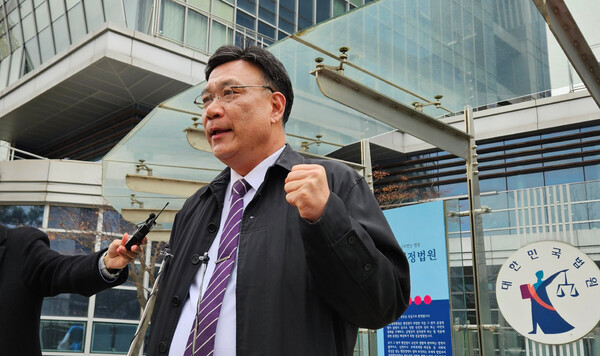Students from 40 medical schools nationwide have set about to file a class action lawsuit against the government to prevent the government from increasing the medical school enrollment quota.
The Korean Association of Medical Colleges and Medical Graduate Schools (KAMC) has begun recruiting participants for the lawsuit.

Lee Byung-cheol, a lawyer with the law firm Chan-Jong who handles medical community litigation, said Thursday that the student association plans to file the lawsuit on April 1. Lee is handling a lawsuit to cancel the increase of the medical school admission quota filed by professors, trainee doctors, medical students, and examinees, including the Medical Professors Association of Korea (MPAK).
On the same day, a hearing was held on the request for a temporary restraining order filed by Park Dan, chairman of the emergency committee of the Korean Intern Resident Association (KIRA).
"The KAMC has begun accepting applications for participation in the lawsuit from 18,000 medical students nationwide, ranging from the first year of the pre-med department at 40 medical schools to the fourth year of the medical department," Lee said. "This class action lawsuit will determine the outcome of the lawsuit (to cancel the medical school student increase) filed by the medical community."
The most direct and primary victims of this medical student expansion are current first-year students. Their coming forward as a group is legally significant. Most importantly, the court will also take it, Lee explained.
Lee added that the lawsuit also seeks to halt the Feb. 6 decision to increase the number of medical school students by 2,000 and allocate the increased quota to 40 medical school seats. He emphasized that the government plan will likely “infringe on medical students’ right to receive education, which will cause irreparable damage if this is not stopped."
The student association plans to analyze the impact of the student increase on 40 medical schools and submit their analysis to the court. The medical community believes that if the expansion is pushed unreasonably and the educational environment deteriorates, getting accreditation from the Korean Institute of Medical Education and Evaluation will be difficult. Medical schools that fail to receive accreditation from the agency lose their graduates' eligibility for the national medical examination.
"Some medical students say that their universities are barely passing the accreditation process even now," Lee said. “If the expansion goes ahead, it will lead to an 'unconditional failure.’ They are very concerned that they will not be able to graduate and take the national examination."
Lee continued, "It's hard to say the exact scale of the lawsuit yet. I don't know if it will be 5,000 or more than 10,000 plaintiffs. All the medical students involved in this lawsuit are plaintiffs in the case and will seek the court's judgment."
Related articles
- 2,460 medical students intend to join army but government tells them to return to study
- 'Void of trainee doctors, Big 5 hospitals could suffer bankruptcies in a cascade'
- Court to decide whether to suspend medical student increase as early as Friday this week
- Number of resigned interns and residents nears 10,000
- President Yoon nails down his push to increase medical school admission quota by 2,000 seats
- Trainee doctors remain skeptical of Yoon’s dialog offer; counter-propose a post-election meet
- Government to review proposal to postpone med student increase for 1 year: vice minister

